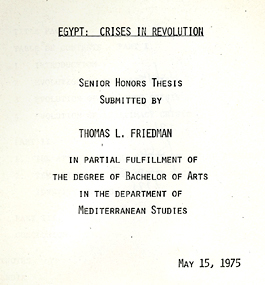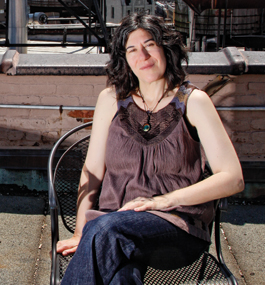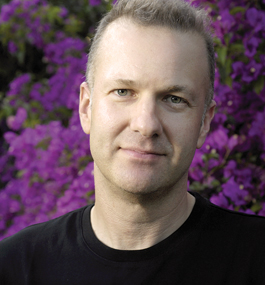Great Expectations
Music-industry luminary Jon Landau, political activist Angela Davis and Pulitzer Prize-winning columnist Thomas Friedman are among the leading Brandeisians whose senior thesis holds hints of future renown.

by Lawrence Goodman
Every year, a small group of passionate, determined and possibly foolhardy seniors elect to produce a substantial work of original scholarship.
The senior thesis is a rite of academic passage for ambitious undergraduates. Starting in the fall semester of senior year, about 20% of each graduating class, or roughly 175 students, devote countless hours to intensive research on their topic. Over the spring semester, they write and rewrite their thesis before making a formal thesis defense in April. In the best Brandeis tradition of mentorship and academic rigor, each student works closely with at least one professor, who serves as the thesis adviser from concept to completion.
Seniors have written nearly 7,000 theses since 1987, when the university started keeping track of the numbers, says assistant registrar Sandra Fallon-Ludwig. Several thousand of them, dating as far back as Brandeis’ first graduating class, in 1952, are preserved in the Robert D. Farber University Archives and Special Collections, available for the general public to read.
Some thesis writers may regret spending most of their final undergraduate year in the library stacks. For others, the effort is clearly the beginning of an intellectual journey that forever alters their worldview and launches them into their careers.
The handful of examples discussed here fall into the latter camp. By turns poignant, funny and brimming with youthful certainty, these theses shed light on what a few of the university’s most famous and accomplished alumni were thinking in their early 20s, and offer glimpses of the brilliance and success to come.

Mike Lovett
page 2 of 8
Jon Landau ’68, H’19
“A History of the Development of Soul Music: 1930 to the Present”
Long before he became Bruce Springsteen’s producer and manager, and got elected to the Rock & Roll Hall of Fame, Jon Landau was fascinated by soul music. His thesis chronicles the history of the genre, from the rise of blues player Robert Johnson through Little Richard and Otis Redding.
“Little Richard’s music was hysterical,” Landau writes. “It was shouted from beginning to end and was punctuated with frenzied cries of pain.” He describes James Brown’s live performances as “orgies of frenzied excitement.”
Landau also offers observations on what makes a great artist. “Rarest of all are those who see themselves as individuals prepared to make any sacrifice to preserve the integrity of their art,” he writes.
In the thesis’ last section, Landau writes about a trip he took down South to meet with key figures in the soul music industry. In Macon, Georgia, he visited with Phil Walden, who managed several big-name R&B acts. His flight there on a prop plane was turbulent. “By the time the plane landed,” Landau writes, “I had lost several pounds in sweat and had wasted the entire flight in prayer.”
Landau also spent time on the ranch of Otis Redding, who had died a year earlier. As Redding’s widow, Zelma, walked Landau around the property, she recalled the first time she heard the demo tape of “(Sittin’ on) The Dock of the Bay.” She didn’t like it. The song went to the top of the charts when it was released in 1968.
Walden, who managed Redding, also didn’t see the song’s appeal at first. Walden “ruefully admits” being “absolutely oblivious,” Landau writes.
During Landau’s visit, Redding’s son Dexter asked him if he played guitar. Landau writes that he “beat out a version of the ‘Theme From Peter Gunn’ [a popular television show] on a Fender Jaguar.” In response, Dexter, then around 8 years old, sang “The Dock of the Bay” with “a resonance and depth that was startling. In addition, he got so close to his father’s phrasing and pronunciation that if you turned your back you would think you were listening to Otis Redding.”
Later, Dexter and his brother, Junior, performed the song together. Dexter “copied [his father’s] voice while Junior danced and strutted about as if he were Otis Redding resurrected,” Landau writes.
Landau expected his account of his Southern trip to appear as an article in an upcoming issue of Rolling Stone magazine. It never did.
Still, Landau’s thesis — and his thesis adviser — nurtured a perspective that helped catapult his career. “The great historian Stephan Thernstrom was my adviser and gave me an unusual amount of freedom on this,” Landau says today. “I combined my personal interests with my academic studies — history, psychology, sociology, art — and developed my own point of view. I’ve continued developing and evolving that point of view right up until the present.”

Mike Lovett
page 3 of 8
Debra Granik ’85
“Environmental Protection: A Citizens’ Movement”
The works of iconoclast filmmaker Debra Granik straddle social advocacy and art.
“Winter’s Bone” (2010) chronicles a teen girl barely eking out an existence in Missouri’s Ozark region. “Down to the Bone” (2004) portrays a working-class woman in upstate New York who’s recovering from long-term drug use. The documentary “Stray Dog” (2014) explores the lifelong effects of combat and post-traumatic stress on a Vietnam-era veteran. Granik is currently finishing up another documentary, about life after incarceration.
Her Brandeis thesis explores the history of environmentalism since the 1960s. It gives special attention to the role of women and feminism in the movement’s development. The eco-feminist perspective, she writes, challenges “the prevailing patriarchal view of nature as an economic resource to be exploited.”
“Because feminists recognized that human beings depend on nature for their sustenance, they believed that the fate of the Earth and the fate of humans are inextricably linked,” she adds.
Rereading her thesis with her near-college-age daughter was gratifying, Granik says today. “On a very personal level, my daughter and I thought it was fantastic that Brandeis and other universities have these documents that represent how millions of students have formulated their worldview over the ages.
“It made us feel part of a long flow of human effort, and the instinct to care.”

Mike Lovett
page 4 of 8
Deborah Berebichez ’96
“Time in the Philosophy of Emmanuel Levinas”
Deborah Berebichez has made a career out of explaining complicated science to ordinary folks. With a PhD in physics from Stanford, she makes advanced statistics, wave science, Einstein’s theory of the photoelectric effect and the physics of high heels easy to understand through her appearances on TV shows, documentaries and her own YouTube channel.
With her senior thesis, Berebichez makes an arguably even tougher subject — the abstruse writings of French philosopher Emmanuel Levinas (1906-95) — comprehensible. Levinas used ideas from Jewish learning, existentialism and ontology to argue that the Western concept of reason should be replaced by a personal ethical responsibility to others.
At the outset, Berebichez acknowledges the terrain might get rocky. “At times, when the explanations are long, the reader may feel impatient and think ‘where is it all headed?’” she writes.
She goes on to explicate Levinas’ 1947 book “Time and the Other” in chapters with such titles as “The Hypostasis Encounters the World.” Explaining Levinas’ ideas is challenging, Berebichez writes, because “his philosophy refuses to be a system. Levinas demands of his readers a new way of reading.”
Ultimately, Berebichez writes, Levinas urges us to break free of self-absorption and engage ethically with other people. She offers this illustration: “For example, if after going out to celebrate — dining at a fancy restaurant — I encounter a homeless person face to face, the sight of that person’s face, says Levinas, sobers me up. She breaks my selfish enjoyment and captures my attention for me to act upon my goodwill.”

Tanit Sakakini
page 5 of 8
David Grae ’89
“The Jewish Mother”
David Grae, who co-produced the TV show “Gilmore Girls” and executive produced “Madam Secretary” and “Castle,” brings up his mother at the beginning of his thesis, a collection of short stories about Jewish mothers.
“Okay, I’m not big on dedications, especially in a thesis,” he writes, “but I have to dedicate this to my mother because it only could have been written by someone who has a Jewish mother.”
In the first story, “Getting Out of the House,” Stanley, of bar mitzvah age, gets an awkward initiation into manhood on an overnight camping trip, when a girl enters his tent. He returns home to tell his parents he wants to marry her.
“We send the kid on Outward Bound to have some fun, to grow up a little, he finds a wife,” Stanley’s mom says. She tries to dissuade Stanley by telling him his bride-to-be’s parents are “psychopaths.”
The narrator of a story titled “Beverly” is a Brandeis student who rents a Waltham apartment with the story’s title character, whom he meets in a convenience store. She turns out to be “into the devil.” The narrator, mostly blasé about this revelation, lays down a house rule — “no spells on housemates.”
Yet one day, as the narrator drives to Brighton with two of Beverly’s friends, both of them high on coke, he realizes, “I’m scared. I’m terrified. My imagination has taken over. I’m picturing my funeral. My mother orating over and over, ‘How could he be so stupid? How could he be such a moron.’”
Authors Geoffrey Wolff and Leslie Epstein were Grae’s thesis advisers. “They were the first people to tell me they thought I could be a professional writer,” he remembers. “Leslie gave me the best compliment I had yet received at the tender age of 21. He said that of the thousands of writers he had worked with in 25 years teaching creative writing, I was among the top three. It is still the most exciting compliment I ever received.”

Columbia GSAPP/Wikimedia Commons
page 6 of 8
Angela Davis ’65
“The Novels of Robbe-Grillet: A Study of Method and Meaning”
Angela Davis’ journey to becoming a political and civil rights activist, Communist party member, prolific author and now professor emerita at the University of California, Santa Cruz, went by way of avant-garde 20th-century French literature. Her senior thesis centered on the writer Alain Robbe-Grillet, who rose to prominence in the 1950s and ’60s as part of the Nouveau Roman (New Novel) movement.
In Robbe-Grillet, Davis found a kindred spirit. He was part of a “revolutionary school of writers,” she writes, and his body of work, which includes the acclaimed novels “Le Voyeur” and “La Jalousie,” and the script for the classic film “Last Year at Marienbad,” responded to the “break-down of the traditional moral order.”
Davis applauds Robbe-Grillet for dispensing with the literary conventions of plot and authorial omniscience, and rejecting the idea that characters need clear-cut motivations. She writes that the emergence of this new kind of novel will “transcend the limited sphere of literature, provoking repercussions throughout society.”
What Davis discovered at Brandeis — that literature and art play an essential role in encouraging social change — still holds true, she believes. “Literature and other art genres can help us to feel that which we cannot yet articulate in discursive terms,” she says today. “In that sense, [art] can serve as a beacon, illuminating the path that activism can take. Of course, this is a rather simplistic explanation of the relationship between art and struggle — but in the final analysis, both are necessary.”

Brian Irwin/Wikimedia Commons
page 7 of 8
Josh Gondelman ’07
“Anything To Fill the Silence”
To learn how Josh Gondelman became a stand-up comic, and an Emmy and Peabody Award-winning TV comedy writer, you might start with his senior thesis, a collection of short stories titled “Anything To Fill the Silence.” One of the stories, “How Can You Joke About a Thing Like That,” was probably meant more as a personal essay than a piece of fiction, Gondelman says today. After all, its subtitle is “A True Story About Me, Josh Gondelman.”
The story’s narrator, Joshua, is a Brandeis student who spends the summer after his sophomore year taking care of his infirm grandfather. They don’t have much to talk about and mainly discuss baseball or watch cop dramas. “Even as we spent every day together, we began to detach from each other,” Joshua observes.
He watches his grandfather’s slow deterioration and feels the loss of a man he only superficially knows. “I grieved the hardest while he was still alive,” Joshua says.
Despite the somber subject matter, the story is very funny. The visiting nurse who tends to the older man deals with him, Joshua says, “the way a NASCAR driver would deal with a finicky engine; most of the treatment seemed designed to make sure all of grandpa’s bodily fluids remained at the proper viscosity.”
Later, Joshua describes the Jewish tradition of feasting on smoked meats in the days following a death: “The grieving family and their friends consume the flesh of the slaughtered beasts, with the traditional mustard dressing, as they sit in the living room and bullshit (the Bible’s words, not mine).
In the week following my grandfather’s death, I consumed upwards of 20 corned beef sacrifices.” In the story’s final section, Joshua articulates a defense of comedy’s importance in the face of a tragedy. “Humor gives context to emotion,” he says. “It integrates the unprecedented into the realm of the understandable.”
As a writer for HBO’s “Last Week Tonight With John Oliver” and now Showtime’s “Desus & Mero,” Gondelman turns depressing news headlines into raucous comedy. Maybe Joshua offers the most direct explanation for how this came to be: “The best way I know to process emotional distress is to make jokes about it.”

World Economic Forum/Wikimedia Commons
page 8 of 8
Thomas Friedman ’75
“Egypt: Crises in Revolution”
New York Times columnist Thomas Friedman’s thesis may be one of the most ambitious ever written by a Brandeis undergraduate. At 162 pages, it runs nearly twice the length of most theses and, along the way, cites top Middle Eastern scholars, German author Hermann Hesse, Russian revolutionary Leon Trotsky, and Egyptian novelist and playwright Tawfiq al-Hakim.
Though its immediate subject is the Egyptian revolution of 1952 and the rise of Gamal Abdel Nasser, it poses a larger question that the three-time Pulitzer Prize winner continues to write about today: How can the Arab world successfully embrace democracy and modernity?
In the thesis’ first sections, Friedman examines the uneasy mix of Islamic orthodoxy and British colonial rule in Egypt in the 1800s and early 1900s, and the emergence and collapse of a constitutional monarchy in the first half of the 20th century. With that collapse, he writes, “Egypt in particular and the Islamic world in general was sorely in need of a formula that could preserve the best of Islam and yet allow the introduction of new Western ideas.”
Instead, the country saw the rise of a military junta called the Free Officers Movement, followed by Nasser’s authoritarian reign. Friedman is especially critical of Nasser, who, he says, tried to paper over the conflicts and tensions in Egyptian society with nationalism and militarism.
Nasser thought patriotism “peppered, of course, with Islamic symbols” would legitimize his rule, Friedman writes. But “symbols, be they Islamist, Arabist, Liberal Nationalism or whatever — they simply do not suffice. Egyptian Muslims have craved and will crave for something more substantive in line with their own Islamic heritage.”
In his conclusion, Friedman calls for a new path forward for Egypt. The country, he writes, needs someone “capable of uniting the people around both himself and a unified set of principles linked with Islam [that is] necessary for the governance and development of modern Egypt. Only then will Egypt be capable of participating in probably the ‘fundamental experience’ of modern civilization — remaking her environment and shaping her own destiny.”
